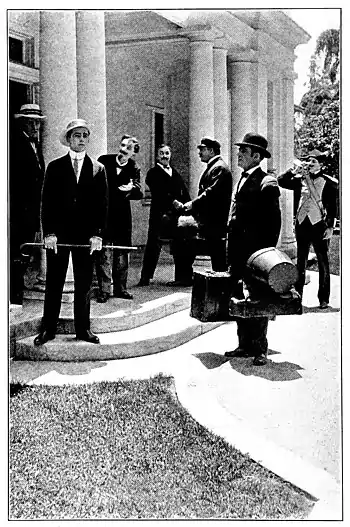CHAPTER XIII
Holocaust
YES, yes," said Mr. Barcus indulgently.
"Very interesting. Very interesting indeed. I've seldom listened to a more interesting life-history, my poor young friend. But I don't believe one word of it. It's all damn foolishness! Particularly this! The rest of your adventures are reasonable enough. They won my credulity—and I'm a native son of Missouri. But this last chapter is impossible. And that's flat. It couldn't happen—and has. And there we are!"
Against the western horizon a strip of sand dunes rested like a bar between the sunset in the sky and the ensanguined sea that mirrored it.
The wind had gone down with the sun, leaving the Seaventure becalmed—her motor long since inert for want of fuel—a mile or so off Nauset Beach.
Farther offshore, the so-called Gloucester fisherman rode, without motion, waters still and glassy. Figures might be seen moving about her decks; and soon she lowered a small boat. A little later a faint humming noise drifted across the tide.

ALAN GAZED IN WONDER; FIRST AT THE "TREY O' HEARTS" AND THEN AT THE ROSE

ALAN'S ARRIVAL WAS THE SIGNAL FOR MUCH EXCITEMENT.
Alan grunted his disgust, but said nothing.
"Don't take it so hard, old top," Barcus advised. Then he rose and dived down the companion-way, presently to appear with a megaphone and a shotgun.
"No cutting-out parties in this outfit," he explained, grinning amiably. "None of that old stuff, revised to suit your infatuated female friend. Once aboard the lugger and the man is mine!"
Stationing himself at the rail, he bellowed through the megaphone.
"Keep off! Come within gunshot and I'll blow your fool heads off!" Putting aside the megaphone, he sat down again. "Not that I'd dare fire this blunderbuss," he confided, "with this reek of gasoline. Phew-w! I've inhaled so much gas in the last few hours, I'm dry clean down to my silly old toes!"
For thirty minutes nothing happened. The fishrman's launch was resting motionless on the water, two figures mysteriously busy in its cockpit, the Seaventure's dory trailing behind it.
Gradually these details were blotted out by the closing shadows. Far up the coast two white eyes, peering over the horizon, stared steadfastly through the dark: "Chatham Lights," Barcus said they were.
Abruptly he dropped the glasses and jumped up. "Hear that?" he cried.
Now the humming of the motor was again audible and growing louder every instant; and Alan, infected with the excitement of Barcus, could just make out a dark shadow that moved swiftly and steadily toward the Seaventure.
"What the devil!" he demanded, puzzled. Barcus grasped his arm excitedly.
"Quick—kick off your shoes—get set for a mile-long swim! Devil's work, all right!" he panted, divesting himself of shoes and outer garments. "I couldn't make out what they were up to till I saw them lash the wheel, light the fuse, start the motor, and take to the dory. They've made a torpedo-boat out of that tender"
He sprang upon the rail, steadying himself with a stay. "Ready?" he asked. "Look sharp!"
The two dived as one, and not until three hundred feet or more separated them from the schooner did either dare pause for a backward glance.
Then the impact of the launch against the Seaventure's side rang out across the waters, and with a roar the launch blew up, spewing skyward a wide-spread fan of flame. There followed a crackling noise, and bright flames licked out all over the schooner from stem to stern. It seemed minutes that she burned in this wise—it was probably not so long—before her decks blew up and the flames swept roaring to the sky.
By the time Alan and Barcus had gained shoal water that permitted them footing to wade ashore, waist-deep, the Seaventure had burned to the water's edge.